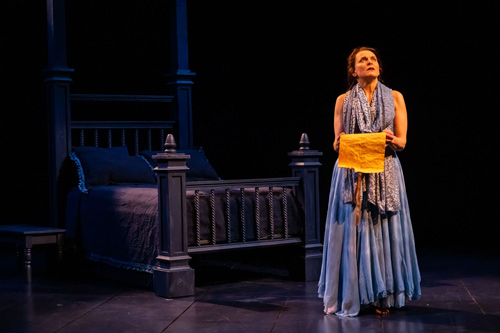By GLENN DOBBS
A Seat on the Aisle
In 1998, during the press tour for the Academy Award winning film Shakespeare in Love, Joseph Fiennes, who played the title role, was asked how he created the character.
“It was easy,” he replied, “No one knows anything about him. I could do whatever I wished.”
Playwright Vern Thiessen paints on a similar blank canvas with Indiana Repertory Theatre’s Shakespeare’s Will. Here we are introduced to Anne Hathaway, Shakespeare’s wife, whom we know even less about than the Bard. In this play, the author again takes artistic license to create out of whole cloth the life of a woman whose main claim to fame is that she was married and abandoned by the greatest literary figure of the Western world. It is difficult to create anything that is historically accurate when we know so little about her.
What we do know is she was eight years older than Shakespeare when they wed and they married in haste due to Anne getting pregnant out of wedlock. She gave birth to the first of their three children only six months after the nuptials. For most of Shakespeare’s life, he left her alone in Stratford while he cavorted around London, and, famously, when he died he left her his “second best bed.”
That’s all. We know little else.
So be it. We are left to imagine what might have been. Out of this clear ether we must find a real three-dimensional character with a compelling story of her own. A tall order for any actor.
Into this void steps Tracey Michelle Arnold as Anne. The play opens with the funeral of Shakespeare. From this fresh earth, like a sculptor, Ms. Arnold creates a vivid portrayal of the life of a woman that is interesting, vivid, passionate, funny, tragic, and thoroughly human. It is an assured and commanding portrayal. We see Anne, or at least what we imagine her to be, come to life and discover she had dreams and desires of her own. No less than that of her neglectful husband.

Tracey Michelle Arnold as Shakepeare’s wife, Anne Hathaway. (Photo by Zach Rosing)
Ms. Arnold delivers a tour de force performance as she ranges about the stage using character voices, climbing on set pieces, song, dance, and devastating emotion to mesmerize you. You witness the life of Shakespeare through a domestic lens. You learn that maybe he was not the man you might have imagined. More importantly you are introduced to a woman who also deserved to be heard. She too mattered.
The direction by Brenda Devita was solid with excellent blocking and good use of the dominant set piece, the infamous second-best bed. Ms. Davis deserves an award for the most creative use of a pashmina wrap since Sex and The City. This simple prop was used with great effect throughout the play to create scene after scene of the life of Anne.
Similarly, the scenic and lighting design by Scott Penner and Dawn Chiang created the mood for this fevered memory play. The lights, soundscape, and music transported you to different events in Anne’s long life to great effect.
If I have anything to quibble about it would be the story itself. More than a few times the author, in an attempt to reach an audience today, injects notes of modernity into his creation. The results are often anachronistic and took me out of the tale. This protagonist lived in a world over four hundred years ago. Her environment and cultural mores were very different. It is unlikely some of the choices she makes in the story would ring true to the period.
However, Mr. Thiessen writes, “….Those audience members who desire a historical representation of Anne Hathaway’s life may be disappointed. Instead, I have used the will (of Shakespeare) as a springboard for my own imagination and artistic goal – to explore the journey of a woman who faces adversity, rises above it, and ultimately re-kindles faith in herself.”
Fair enough. Mr. Thiessen offers an imaginary tale and, given the scarcity of facts we know, it is a very plausible one. We want to get to know a figure of history long passed. It’s a good story. Anne remains an endless source of fascination.
We want to know more. To that end Shakespeare’s Will delivers. It offers a journey to get to know a woman veiled by the erosion of time. In this story, she comes alive and for a brief 90 minutes, you get to hear her voice, her longings, her joys, and her pains. She wants to be seen. And you witness her.
The Holy Trinity Church in Stratford-upon-Avon, England, is a well-known site for Shakespeare pilgrims. Here is where the Bard was baptized and where his tomb lies. As you approach the altar you will find his bust on the left wall in front of his tomb.
There on the floor in front of the altar lies a small plaque with a Latin epitaph. It is the humble grave of Anne Hathaway. Her daughter Susanna wrote the sentiment. The last line reads:
“…Come quickly, Christ, that my mother, though shut within this tomb may rise again and reach the stars.”
Bottom line: I highly recommend Shakespeare’s Will. It is playing on the Indiana Repertory Theatre UpperStage through April 16. Tickets can be obtained at IRTlive.com.
Read more great play reviews from A Seat on the Aisle at asota.wordpress.com.

